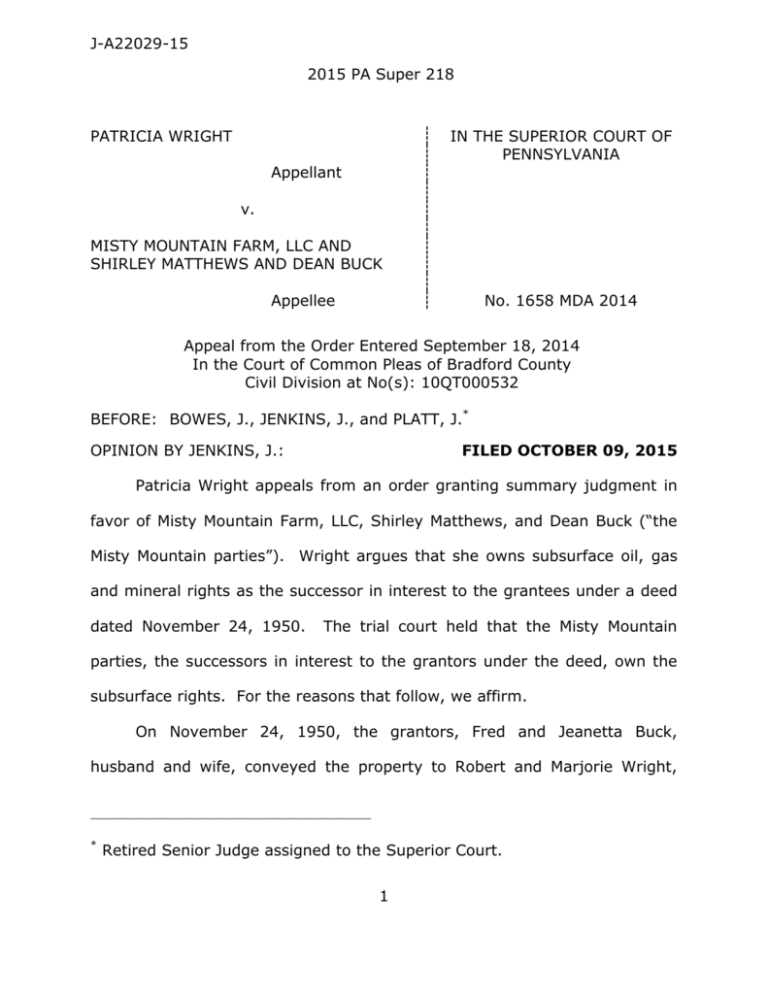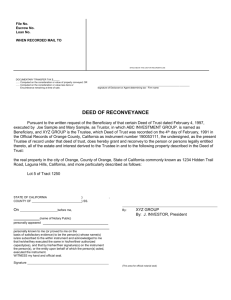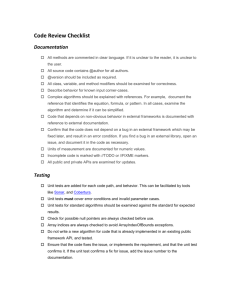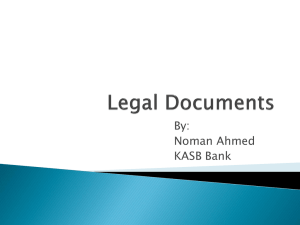
J-A22029-15
2015 PA Super 218
PATRICIA WRIGHT
IN THE SUPERIOR COURT OF
PENNSYLVANIA
Appellant
v.
MISTY MOUNTAIN FARM, LLC AND
SHIRLEY MATTHEWS AND DEAN BUCK
Appellee
No. 1658 MDA 2014
Appeal from the Order Entered September 18, 2014
In the Court of Common Pleas of Bradford County
Civil Division at No(s): 10QT000532
BEFORE: BOWES, J., JENKINS, J., and PLATT, J.*
OPINION BY JENKINS, J.:
FILED OCTOBER 09, 2015
Patricia Wright appeals from an order granting summary judgment in
favor of Misty Mountain Farm, LLC, Shirley Matthews, and Dean Buck (“the
Misty Mountain parties”). Wright argues that she owns subsurface oil, gas
and mineral rights as the successor in interest to the grantees under a deed
dated November 24, 1950.
The trial court held that the Misty Mountain
parties, the successors in interest to the grantors under the deed, own the
subsurface rights. For the reasons that follow, we affirm.
On November 24, 1950, the grantors, Fred and Jeanetta Buck,
husband and wife, conveyed the property to Robert and Marjorie Wright,
____________________________________________
*
Retired Senior Judge assigned to the Superior Court.
1
J-A22029-15
husband and wife and their “heirs and assigns”. The deed had two
“exceptions and reservations” which provided:
Excepting and reserving unto the herein grantors [the Bucks] all
rights in oil, gas and minerals on property hereby conveyed with
the right of ingress and egress and the further right to build or
establish coal tipples, and to remove said minerals with least
damage as possible to said lands, said oil and gas having been
leased under Lease dated June 16, 1949, as more fully appears
in Bradford County, Pennsylvania, Lease Book 20 at page 57.
Further, reserving unto the herein grantors the right to maintain,
operate and use saw mill on said property for a period of six
months from the date hereof, all property of said mill to be fully
removed from said premises six months from the date hereof.
Deed dated November 24, 1950 [emphasis added].
In the June 16, 1949 lease, the Bucks leased oil and gas rights to
Harold Conn and Warren Anglin for “the term of ten years from the date
hereof and as much longer as the said premises are being operated for the
production of oil or gas, or as oil or gas is found in paying quantities ...” It
appears that this lease ended in or before 1971, because beginning that
year, and continuing for most of the next four decades, members of the
Wright family entered into several subsurface leases with other companies.
In 1971, Robert and Marjorie Wright leased both the land and
subsurface rights to Shell Oil Company for 10 years. In 1988, Robert and
Marjorie Wright conveyed both the land and subsurface rights by deed to
David and Patricia Wright.
In 1996, David and Patricia Wright conveyed
both the land and subsurface rights via deed to Patricia Wright.
-2-
In 2001,
J-A22029-15
both David and Patricia Wright1 leased the land and subsurface rights to
Central Appalachian Petroleum. In 2005, David and Patricia Wright leased
the land and subsurface rights to another lessee, Keeton Group LLC.
In 2010, Shirley Matthews, administratrix of the estate of Jeanetta
Buck, conveyed the subsurface rights on the property to the Misty Mountain
parties. A dispute arose between the Misty Mountain parties, successors in
interest to the grantors in the 1950 deed, and Patricia Wright, the successor
in interest to the grantees in the 1950 deed, over the ownership of the
subsurface rights.
In August 2010, Wright filed a complaint seeking a declaratory
judgment that the Misty Mountain parties have no ownership rights in the
oil, gas or minerals beneath the surface of the property.
subsequently filed an amended complaint.
Wright
The Honorable Maureen Bierne
denied the Misty Mountain parties’ preliminary objections to the amended
complaint and their subsequent motion for judgment on the pleadings.
There was no discovery. The Misty Mountain parties then filed a motion for
summary judgment, which Judge Bierne granted.
Wright filed a timely
notice of appeal and a timely Pa.R.A.P. 1925 statement.
Although Judge
____________________________________________
1
In view of the 1996 deed to Patricia Wright, it appears that Patricia should
have been the sole lessor. Nevertheless, both Patricia and David are lessors
in the lease.
-3-
J-A22029-15
Bierne did not file a Pa.R.A.P. 1925(a) statement or opinion, her September
9, 2014 memorandum is sufficient for appellate review.
Wright raises two issues in this appeal:
1. Did the trial court err when it failed to adhere to the ‘law of
the case’ in granting summary judgment in favor of [the Misty
Mountain parties] and against [Wright] on essentially the same
arguments the court had denied preliminary objections and
motions for judgment on the pleadings?
2. Did the trial court err in granting summary judgment in favor
of [the Misty Mountain parties] and against [Wright] in a case
where a material, factual dispute exists as to the intention of the
parties in consummating a real estate transaction evidenced by a
deed dated November 24, 1950, wherein there exists an
exception and reservation of oil, gas and minerals with specific
reference to an oil and gas lease which was for a specific term of
ten years from June 16, 1949?
Brief For Appellant, at 4.
Our standard of review of an order granting summary judgment
requires us to determine whether the trial court abused its discretion or
committed an error of law. Petrina v. Allied Glove Corp., 46 A.3d 795,
797–98 (Pa.Super.2012). Our scope of review is plenary. Id. In reviewing
a trial court’s grant of summary judgment, we apply the same standard as
the trial court, reviewing all the evidence of record to determine whether
there exists a genuine issue of material fact. Id. We view the record in the
light most favorable to the non-moving party, and all doubts as to the
existence of a genuine issue of material fact must be resolved against the
moving party. Id. Only where there is no genuine issue as to any material
fact and it is clear that the moving party is entitled to a judgment as a
-4-
J-A22029-15
matter of law will summary judgment be entered. Id. All doubts as to the
existence of a genuine issue of a material fact must be resolved against the
moving party.
Id.
Upon appellate review, we are not bound by the trial
court’s conclusions of law, but may reach our own conclusions. Id.
Wright first argues that the law of the case doctrine prohibited the trial
court from entering summary judgment against her, because the court
previously denied the same argument in the Misty Mountain parties’
preliminary objections and motion for judgment on the pleadings.
We
disagree. The law of the case doctrine states that a court involved in the
later phases of a litigated matter should not reopen questions “decided by
another judge of that same court or by a higher court in the earlier phases
of the matter.” Morgan v. Petrol Products Equip. Co., 92 A.3d 823, 827
(Pa.Super.2014). A trial judge may always revisit her own pretrial rulings
without violating the law of the case doctrine.
Id.
Here, at summary
judgment, Judge Bierne reconsidered her own rulings made in prior stages
of the case. There was no violation of the law of the case doctrine.
In her second issue on appeal, the central issue in this case, Wright
argues that summary judgment was improper under the language of the
1950 deed, because a genuine issue of material fact exists as to the intent of
the parties in the oil, gas and minerals exception recited above.
When construing a deed,
a court’s primary object must be to ascertain and effectuate
what the parties themselves intended. Mackall v. Fleegle, 801
-5-
J-A22029-15
A.2d 577, 581 (Pa.Super.2002). The traditional rules of
construction to determine that intention involve the following
principles. First, the nature and quantity of the interest conveyed
must be ascertained from the deed itself and cannot be orally
shown in the absence of fraud, accident or mistake. Id. We seek
to ascertain not what the parties may have intended by the
language but what is the meaning of the words they used. Id.
Effect must be given to all the language of the instrument, and
no part shall be rejected if it can be given a meaning. Id. If a
doubt arises concerning the interpretation of the instrument, it
will be resolved against the party who prepared it. Id. ... To
ascertain the intention of the parties, the language of a deed
should be interpreted in the light of the subject matter, the
apparent object or purpose of the parties and the conditions
existing when it was executed.
Consol. Pennsylvania Coal Co. v. Farmers Nat. Bank of Claysville, 960
A.2d 121, 128 (Pa.Super.2008), reversed on other grounds, 969 A.2d 565
(Pa.2009). Moreover,
[i]n the absence of fraud, accident or mistake, the nature and
quantity of the real estate interest conveyed must be
ascertained from the deed itself and cannot be shown by parol.
When the language of the deed is clear and free from ambiguity,
the intent of the parties must be determined from the language
of the deed. With respect to unambiguous deeds, a court must
ascertain what is the meaning of the words used, not what may
have been intended by the parties as shown by parol.
Wysinski v. Mazzotta, 472 A.2d 680, 682-83 (Pa.1984).
According to Wright, the 1950 deed contained an exception under
which the grantors, the Bucks, had an interest in the oil, gas and mineral
rights for the term of a 1949 lease recorded in Bradford County’s Lease Book
20 at page 57.
Wright claims that the lease expired in 1959, thus
terminating the Bucks’ oil, gas and mineral rights at that time and vesting
the Wrights with these rights from that time onward.
-6-
J-A22029-15
We hold that under the exception in the 1950 deed, Robert and
Marjorie Wright and their successors did not obtain, and have never had,
any ownership interest in the subsurface rights.
As a matter of law, the
Bucks retained ownership of the subsurface rights under the 1950 deed, and
the Misty Mountain parties, as successors to the Bucks, own the subsurface
rights today.
Our discussion rests largely upon this Court’s analysis of “exceptions”,
“exceptions to exceptions” and “reservations” in Ralston v. Ralston, 55
A.3d 736 (Pa.Super.2012). Ralston observes:
The terms ‘exception’ and ‘reservation’ have been used
interchangeably in deeds. Walker v. Forcey, [] 151 A.2d 601,
606 (1959). A reservation pertains to incorporeal things that do
not exist at the time the conveyance is made. Id. See
Lauderbach–Zerby Co. v. Lewis, [] 129 A. 83, 84 (1925)
(reservation is creation of a right or interest that did not exist
prior to grant). However, even if the term ‘reservation’ is used, if
the thing or right reserved is in existence, then the language in
fact constitutes an exception. Walker, 151 A.2d at 606; Silvis
v. Peoples Natural Gas Co., [] 126 A.2d 706, 708 (1956)
(where no new rights are created, language treated as
exception). If there is a reservation, it ceases at the death of
the grantor, because the thing reserved was not in existence at
the time of granting and the thing reserved vests in the grantee.
Id. An exception, on the other hand, retains in the grantor the
title of the thing excepted. Id. Because the exception does not
pass with the grant, it demises through the grantor’s estate
absent other provisions. Id. at 709.
Id. at 741-42 (emphasis added). Title to the thing subject to an exception
remains with the grantor. Id. On the other hand, if there is an “exception
to an exception,” title to the thing goes to the grantee. Id. at 741-43.
-7-
J-A22029-15
The facts in Ralston also bear careful analysis.
There, Father and
Mother (“Grantors”) owned a parcel of land as tenants by the entireties. In
a deed dated June 30, 1984, they conveyed the surface estate to their son,
Walter Francis Jr. (“Walter”). The deed stated:
EXCEPTING AND RESERVING unto the Grantors, parties of the
First Part, the following:
1. All timber, coal, gas, oil, and all other minerals in and upon
the said property together with the right of ingress, egress, and
regress, in cutting, digging for, drilling for, or any other
appropriate method of removal for said timber, coal, gas, oil or
any other minerals, and the carrying away of the same.
2. The right of ingress, egress, and regress to any and all
portions of the said property at any time for any and all
purposes during their natural lifetime.
3. This property shall not be sold, granted, or conveyed, in whole
or in part, to another during the natural lifetime of the
GRANTORS.
4. The above exceptions and reservations (item numbers 1, 2,
and 3) become null and void upon the death of both of the
GRANTORS, at which time the rights set forth in item no. 1
above, become vested in the GRANTEE.
Grantor Father died in 1986. In 1991, Grantee Walter conveyed the land to
himself and his wife, Patricia L. Ralston (“Patricia”), as a tenancy by the
entireties. In 1993, Walter died, so the land purportedly passed to Patricia
as the surviving tenant by the entireties. In 1996, Mother, the last original
Grantor, died. In 1999, Patricia conveyed her rights in the land to her son,
Bernard R. Ralston. In short, subsequent to the 1984 deed, Grantee Walter
-8-
J-A22029-15
and his descendants acted like they owned the timber, coal, oil, gas and
mineral rights.
In 2011, Bernard and his wife, Grantee Walter’s descendants, filed an
action to quiet title against Grantors’ heirs (including Bernard’s mother,
Patricia). Bernard and his wife demanded to be declared sole owners of the
land, including all appurtenant timber, coal, gas, oil and other mineral rights.
Grantors’ heirs counterclaimed that they owned these rights. The trial court
entered summary judgment in favor of Grantors’ heirs and against Bernard
and his wife.
This Court reversed and held that Bernard and his wife were entitled to
the timber, coal, gas, oil and other mineral rights. We reasoned:
[P]aragraph 1 [of the deed] speaks to coal, oil, timber, gas and
minerals. These are things that are corporeal, and in existence
prior to the deed. Paragraph 1 did not create a new right.
Therefore, paragraph 1 created an exception. Because it was an
exception, the rights did not pass to Walter, but remained with
the Grantors to dispose of through their estate. The null and void
language does not change the nature of the excepted rights
created in paragraph 1. The trial court did not err in concluding
that the language of paragraph 1 created an exception, rather
than a reservation… [However], the deed created an exception in
regard to the excepted rights... [T]he ‘null and void’ language in
paragraph 4 indicated that the Grantors wished to end the
exception at their deaths and wished that the excepted rights
pass to Walter and not through their estate. This is the only way
to interpret the deed so as to give effect to all of its language.
Otherwise, the exception would utterly trump the ‘null and void’
language, and the excepted rights would pass only through the
Grantors’ estate. That interpretation would nullify paragraph 4…
The excepted rights terminated at the time the last of the two
Grantors died, and then vested in Patricia as the surviving
entireties tenant.
-9-
J-A22029-15
Id. at 742, 743.2 Simply stated, paragraph 1 of the deed in Ralston was an
exception, but paragraph 4 was an exception to the exception under which
the subsurface rights vested in Grantee Walter’s wife, Patricia.
With Ralston in mind, we return to the two paragraphs of the 1950
deed. The second paragraph (the saw mill language) is a good example of
an exception to an exception. The exception permits the Bucks to operate a
saw mill on the land for six months.
Had there only been an exception
which said that “the Bucks can operate a saw mill” without any time limit,
this exception would have “demised through the grantor[s’] estate,”
Ralston, 55 A.3d at 742, and the Bucks, as grantors, would have retained
the right to operate a saw mill for eternity. The six month expiration date,
however, is an exception to the exception that cut off the Bucks’ rights to
operate the saw mill after six months.
After this point, the Wrights, as
grantees, had a right of ejectment against the sawmill.
Conversely, the coal/oil/mineral paragraph in the 1950 deed is an
exception -- not an exception to an exception. This provision states that the
____________________________________________
2
Ralston also held that when Grantee Walter transferred title to himself
and his wife during Mother’s lifetime, he violated the express language in
paragraph 3 prohibiting any conveyances before the death of both Grantors.
Walter, however, did not forfeit his rights under the deed through his
premature conveyance, because “the deed contains no penalty for a
violation of its provisions. The power of equity must know its limits.” Id. at
743. Thus, Walter’s conveyance to himself and his wife was a nullity that
did not divest Mother of title. When Mother died, title passed to Patricia as
the beneficiary of Walter’s estate, Walter having died several years earlier.
- 10 -
J-A22029-15
Bucks retained all rights in oil/gas/minerals under the land subject only to
the lease of oil and gas rights (but not mineral rights) in the 1949 lease.
When this lease ended, the Bucks continued to hold the oil and gas rights.
This language creates an exception under the Bucks retained title to the oil,
gas and mineral rights.
See Ralston, 55 A.3d at 742.
Nothing in this
language constitutes an exception to the exception in the manner of the
sawmill paragraph or paragraph 4 in Ralston. To create an exception to the
exception, it would have been necessary to state that “the oil and gas rights
become vested in the grantees at the termination of the lease dated June
16, 1949,” or words to this effect.
Wright argues that the absence of “heirs and assigns” from the
oil/gas/mineral paragraph indicates that the exception was not intended to
extend past the grantors, the Bucks. We disagree. “An exception requires
no words of inheritance, because title to the excepted part is already in the
grantor and never passes from him … [Thus, the phrase] ‘excepting and
reserving the oil and gas’ in a deed is an exception, not a reservation …
hence, words of inheritance are not required.”
Ladner Pennsylvania Real
Estate Law, 6th ed., § 16.06(a); Silvis v. Peoples Natural Gas Co., 126
A.2d 706 (Pa.1956).
In Silvis, Maria and Nancy Trout conveyed their
interest in land to Robert Bush but “reserve[d] their interest in the oil and
gas underlying the above premises.”
Silvis, the successor in interest to
Bush, alleged that Bush owned the oil and gas upon the death of the Trout
- 11 -
J-A22029-15
sisters.
The Supreme Court held that this language created an exception
instead of a reservation, because “the grantors were not reserving to
themselves any new rights but were merely excepting from the terms of
those deeds the oil and gas underlying the property.” Id. at 708. Moreover,
the intent of this language was for title to vest in the Trout sisters’ heirs
upon their death, because “if a particular clause be construed as an
exception from the grant, no words of inheritance are necessary, because
title to the excepted part remains in the grantor [the Trout sisters], and
never passes to the grantee [Bush].”
Id.
Similarly, the exception in the
Bucks’ deed did not require words such as “heirs and assigns”, because the
Bucks already held title to the oil, gas and minerals and never parted with
them. Accordingly these interests passed on to their successors in interest,
the Misty Mountain parties.
The fact that the Wrights have treated the oil and gas as their own,
and have leased the oil and gas several times over the years, is of no
moment. Under the law, title to the oil and gas has always belonged to the
Bucks and their successors in interest, the Misty Mountain parties.
Consequently, the trial court correctly entered summary judgment in favor
of the Misty Mountain parties.3
____________________________________________
3
We have assumed above that the Bucks’ 1949 lease to Conn and Anglin
ended in or before 1971 due to the series of leases thereafter between
Wright family members and other entities. We note that in the unlikely
(Footnote Continued Next Page)
- 12 -
J-A22029-15
Order affirmed.
Judgment Entered.
Joseph D. Seletyn, Esq.
Prothonotary
Date: 10/9/2015
(Footnote Continued)
_______________________
event that the 1949 lease has continued to this day, the result in this appeal
would remain the same, because under Patricia Wright’s theory of this case,
her rights did not vest until the expiration of the 1949 lease.
- 13 -






